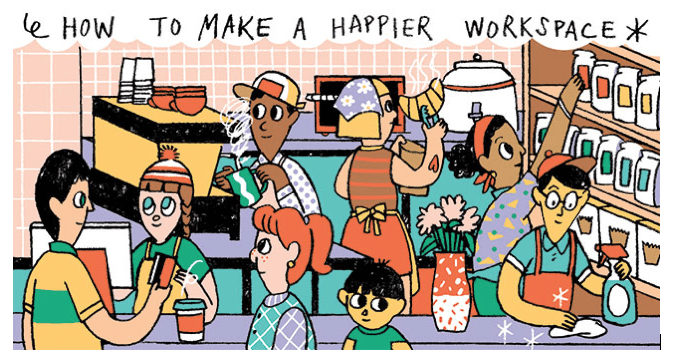
Illustration by Alabaster
Our series, How to Make a Happier Workspace, continues
BY ASHLEY RODRIGUEZ
SPECIAL TO BARISTA MAGAZINE
Before you can begin to make your café a happier and more productive environment, you have to know where your baristas are. You have to be able to assess morale and make changes based on what the current morale status is. How do you assess morale? There’s no one way to do it, but it’s something that needs to be done regularly, seriously, and comprehensively so you don’t glance over or misconstrue something you took for granted.
Employee morale needs to be assessed regularly because it changes ”often and a lot. Do your employees come to work happy? Do they feel supported? Can they do what is expected of them while still providing excellent service? Do they even know what is expected of them? There are a lot of questions to ask, and the answer to assessing morale comes down to one thing: communication.
Communication is going to come up a lot in this series, so get ready to talk a lot and listen to a bunch of feelings.
Informally, you can assess morale just by walking into your café and talking to your staff. It’s often one of those you-know-it-when-you-see-it kinds of things. If it’s not immediately clear to you like that, you should at least be able to make an informal guess. For example, the baristas aren’t smiling. Nobody is moving quickly. The mood is generally dour. Go ahead and stand in line at your shop and see what happens. Watch not just the interactions between baristas and customers, but amongst the baristas. A curt exchange with a customer might be a one-off, but if baristas aren’t talking to each other or getting along, that can be a sign that the mood is off.
You can also use concrete behaviors and trends to formally assess morale. How often are baristas late to work (side note on this that, while helpful, absenteeism and lateness might not be a perfect predictor of morale)? Are there shifts in the week that people refuse to work? Do you have a hard time getting your whole team together for staff meetings or other group-bonding events? The difference between a cringeworthy night out with coworkers and one that is joked about and memorialized for years is how high spirits are within the group.
If you’re still confused or not sure, ask someone. Anyone. If morale is low, everyone knows it. And it won’t always come out as, ˜we all feel like crap at work.’ Perhaps it’ll come out as a question or concern because of a recent change. Maybe a scheduling complaint is raised. Or anything that has the word ˜fairness’ attached. Be especially on the lookout for barista feedback when there’s something different or new, like a new hire or a menu change, because one of the leading causes of low morale is a change in the goals or direction of a business. If a barista came to work at a specialty coffee shop with a focus on serving solely coffee and you unilaterally decide to add flavored syrups, you might have an unhappy group.
That example also illustrates how quickly morale can change. A shift with an improperly trained new hire (which I would venture to guess everyone has had to deal with) or a schedule that gives more desirable shifts to one particular person or group, can cause the vibe to deteriorate, and one of the reasons these things happen so easily and so often is because people don’t know what those around them need all the time. To continue with the scheduling analogy: Managers: do you know what shifts are the hardest to work? Baristas: do you understand how many scheduling conflicts a manager needs to deal with just to make one version of a schedule that somehow works for everyone? Knowing the struggles of both parties makes clear that the overarching goal is for everyone to work together to achieve the same goals. And how do you learn those struggles? Communicate.
See, I told you communication would come up a lot.
It makes sense that communication is a big theme in this series. Studies show that anonymity, irrelevance, and immeasurement in your work lead to a pretty miserable workplace, and yet most people aren’t getting these needs addressed. All these things can be tackled by just sitting and talking to your baristas. If you can’t do that ”i.e. if you work at headquarters or the roaster, so you’re not in the shops often ”encourage them to talk to your leaders/managers who can then talk to you. If you can’t communicate and open the lines of discussion, then there’s no chance your employees will feel happy at work.
How do you begin to set the tone of communication? Next week we’ll talk about hiring for morale.
ABOUT THE AUTHOR
Ashley Rodriguez thought that she’d take a break from teaching middle school science and putz around in a coffee shop for a few months. She ended up digging it way more than teaching (and was vaguely better at it). After spending 5 years making coffee in New York, she moved to the San Francisco Bay Area where she worked for Sightglass Coffee for three years. She recently decided to give full-time coffee writing a go, though she can still be found working bar shifts now and again in Temescal Alley in Oakland. Follow her on Twitter at @ashisacommonname


